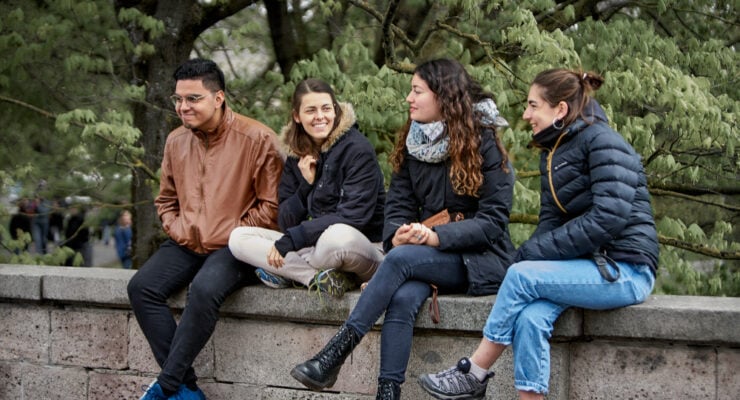Those who live in Europe are blessed with relatively easy access to dozens of countries and hundreds of alluring cities. But if you’re like me and have too many places on your bucket list, at some point you might wonder how you can do everything without breaking the bank.
Here are the most important tips for travelling on a budget in Europe, based on my actual experiences and those of other team members here at pvtistes.net.
1. Take regional and budget airlines instead of flagship airlines
- Flagship airlines generally cost more than their regional and budget counterparts, for example Air France (flagship) versus French Bee (budget). For short-haul flights within Europe, budget airlines are a perfectly viable option with good reliability, just don’t expect VIP customer service if you need to modify your itinerary.
2. Choose the right arrival airport or station
- Some destinations have more than one airport or train station. When booking your plane or train tickets, make sure that you will be arriving at the desired one. Arriving too far from the city centre may incur extra transportation expenses, although it could still be worth it if the tickets are significantly cheaper (provided you have the time and patience).
3. Sleep in a night train
- Not all trains in Europe are high speed. There are night train routes that last 10 hours or even longer, for example from Paris to Vienna. If you’re not in a rush and don’t mind sleeping in a train (usually there are optional add-ons for a bed), this can be a good way to combine spending for transportation and accommodation.
4. Hit two cities that are connected by train
- If Budapest and Vienna are both on your bucket list, why not fly into Budapest, take a one way train to Vienna, and then fly out of Vienna? This way, you can spend less money than two eventual separate roundtrip flights to Budapest and Vienna, while also enjoying the classic experience of travel by train. The extensive rail network in Europe makes this strategy possible for many pairs of cities (another example is Montpellier and Barcelona), but book tickets early because prices fluctuate with supply and demand.
Planning to travel for several weeks to several destinations? You might be able to save money with an
Interrail Pass.
5. Go during off season
- Summer is the high season for travel in most of Europe. If possible, go during colder seasons. For destinations in Southern Europe such as Portugal, Italy, and Greece, this can be actually the most enjoyable time to go. Crowds are minimal, prices are low, and temperatures are moderate. When I spent 6 days in Portugal in February, it was between 18 and 20 degrees celsius, which even locals said was exceptionally fine weather.
6. Choose your destination wisely
- Some destinations are objectively cheaper than others. For example, Porto is cheaper than Paris, which is cheaper than London, which in turn is cheaper than Zurich. Consider your budget when picking your destination to avoid overextending yourself. There are plenty of other cities to choose from beyond just the famous ones.
7. Stay at hostels instead of Airbnbs or hotels
- Europe has an amazing culture of hostels. Not only is it a great way to save money, but it also presents the opportunity to meet people from around the world. Some hostels even include free breakfast and dinner, which can really make a difference for conscientious travellers. Beyond just the price, also look carefully at the location, as staying too far from the city centre could lead to more transportation costs.
Hostelworld has some great options for accommodation. Additionally, it also has a feature that allows you to connect and chat with other travellers that will be in the same city at the same time as you.
8. Cook your own meals
- Most hostels have a common kitchen so travellers have the option of cooking their own meals. A simple pasta, for example, doesn’t require extensive skills or ingredient lists. Or cook with your new friends from the hostel and share a meal.
9. Try couchsurfing
- Couchsurfing.com is a platform that connects travellers with local hosts who are willing to house them for free. There is a subscription fee to access the platform. Similarly, the Facebook group Host A Sister is a space dedicated to women. These are resources that members of our team have used in the past and would recommend!
10. Take local public transportation
- Taking public transportation is obvious, but also look into day passes and weekend passes. If a city is not fully walkable, then those passes could very well be worth the money. Additionally, some transportation passes actually include free or reduced admission to attractions too. For example, the Navegante day pass in Lisbon includes unlimited rides on public transportation and free admission to the very popular Santa Justa Lift, which otherwise costs almost as much as the Navegante pass itself.
11. Pack light so you can walk more
- For short trips, pack light and try to fit everything into a backpack. That way, you can walk further and avoid the need to call expensive taxis or Ubers.
12. Reserve free admission to museums and attractions
- Some museums and attractions in Europe free admission on certain days. This often falls on the first Sunday of every month. A few popular examples include the Colosseum in Rome, the Musée d’Orsay in Paris, and the Museum of Art Architecture and Technology (MAAT) in Lisbon. Some might offer free entry on other days of the week, for example Thursday evenings at the Picasso Museum in Barcelona. Also check if you need to reserve a free ticket online, as is sometimes the case. For attractions that don’t require reservation, try to show up early to avoid long lines, as you won’t be the only one to have the idea.
13. Prioritize activities and foods that actually interest you
- We’ve all searched on Google “things to do in [city]”. But just because Google tells you that everyone goes to museum X and eats dish Y, doesn’t mean that you also have to pay for museum X and dish Y. Spend money on what interests you, rather than what interests everyone else.
14. Travel with friends
- This might be obvious, but consider travelling with one or a couple of friends and divide the cost of accommodation. To avoid potential conflicts, try to pick friends who have a similar travel style and budget as you.












 Français
Français English
English



0 comments
{{like.username}}
Loading...
Load more